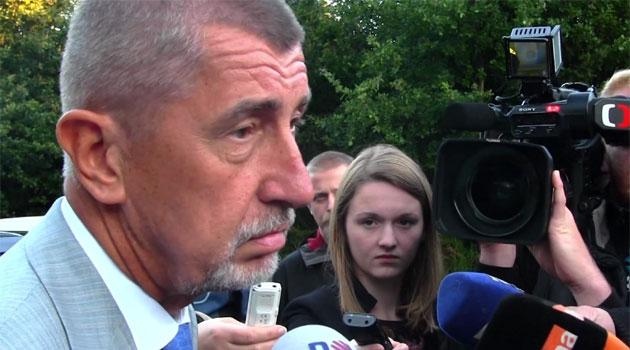Analysis: How the Czech media handled the Vice PM's anti-Roma election stunt

What was the Czech Vice Prime Minister’s visit to Varnsdorf about?
Here we go again. The Czech Vice PM and Finance Minister is the first Czech politician in a long time to play the “Roma card” and dominate media coverage for a week.
He made a splash, immediately quasi-apologized – on the floor of the lower house, even – but he has basically come out of this scandal as the victor. He said things about Romani people that a large part of society has believed since time immemorial.
It is he who was the first to bravely enter the lion’s den and personally point out, for all to see, the sensitive problems that this involves. Prior to his remarks, for more than a year, the topic of Romani people has been absolutely missing from the national media, placed on the back burner of media interest.
Why was that? Had anything changed, or had the media improved its approach towards this topic?
It’s hard to say, but the facts are that since last summer, Romani people as an object of media interest have been replaced by the topic of refugees. There are almost no refugees living in this country, but the topic still functions as a straw man in the appearances of many media figures and politicians.
If, as the media, you pay attention to the refugee issue, you run no risk. It is precisely what media consumers like to hear about, read about, and watch.
The symbolic borders of “us and them” don’t just improve “our” perceptions of ourselves – they also improve media ratings. Fear sells and has since time immemorial.
The concept of “us and them”
During the 1990s, the media almost exclusively mentioned Romani people in crime reporting only. That was a sign of the times.
The state of the Czechoslovaks had been divided in two by the end of 1993 and in its place the states of the Czechs and Slovaks arose, seeking their new identities. National identity is almost always created by defining what one is not.
In the Czech case, those who bore the brunt of this identity formation were the Czech Republic’s Romani residents. They became the “black sheep” of the new state.
Ever since then, some politicians have abused the aversion felt by various parts of society towards Romani people during elections in order to score points, figures such as Miroslav Sládek of the Republican Party, Jiří Čunek of the Christian Democrats, and several representatives of the Civic Democrats, the Communist Party of Bohemia and Moravia, and the Social Democrats – to say nothing of nationalist or directly neo-Nazi parties such as the National Party or Workers’ Party. After the series of anti- Romani demonstrations here during 2008, 2011 and 2013, in which a significant proportion of demonstrators attacked police officers, either physically or verbally, both the public relations departments of police forces and representatives of the media have apparently learned a few lessons.
Today, for the most part, neither the Czech Police nor the Czech media report the ethnic origins of crime suspects – at the most, they publish photographs of them, or film footage from court hearings. Surprise, surprise – the vast majority of perpetrators of serious crimes in the Czech Republic suddenly turn out to have white skin.
Politicians from the parties seated in Parliament have recently hesitated to touch on the topic of Romani people at all, for the most part. It hasn’t even been necessary for them to do so – it’s been enough to raise the topic of migration.
Learning from the past
All of that applied until last week, when the Czech Finance Minister, as part of his election campaign, traveled to Varnsdorf. He opened a school there, visited a local factory, and did not refuse the offer of the local municipality to take a look at the local slum – or as such places are called today, the socially excluded locality – and to speak with those who live near it.
The controversy today is over what exactly he said there, since the journalists who were present at the time either did not record him or have yet to release their audio recordings. After returning to Prague, of course, he said the following to the media: “I visited the Romani homes there – and it was really a strong experience. I have never seen such filth and untidiness.”
Speaking on Tuesday at the site of the mass graves of victims of a former concentration camp, he said this: “We need to integrate these people so they will begin going to work and showing a good example to their children.” This is necessary, in his view, only for the reason that the “indigenous” inhabitants are in the minority today [in the locale he visited], that they are endangered, and that they fear for their lives.
“This is the shame of the state, because for 25 years it has failed to resolve the situation of the Roma in Varnsdorf. Where did the money for their integration go? Why does the state let traffickers in poverty constantly make money, why doesn’t it do its best to enforce mandatory school attendance, why doesn’t it have more assistants to work with Romani youth?” the Czech Finance Minister asked.
How the Czech media and other parties might have reacted
So much for the chair of one of the governing parties. How are we to assess his behavior?
Is this an attempt to once again stir up racist passions – or is it just the clumsy mouthing off of a politician who in certain situations does not watch his words? In the first place, the Finance Minister has opened up an important topic here: The Government programs for integrating socially excluded people frequently do not work.
The ghetto on Kovářská Street in Varnsdorf is just one of many examples of places that have long awaited a resolution in vain. The same applies to the undignified memorial to the Romani victims of Nazism that takes the form of a foul-smelling industrial pig farm.
Neither in Lety u Písku, nor in Varnsdorf, however, did the Finance Minister speak with Romani people about these problems personally. He just used them as backdrops for his campaign.
In the second place, what Babiš said during these appearances is insulting to one of the ethnic minorities living in this country, as a whole. Again, he has bolstered the stereotype that “Rom = filth, unwillingness to work, problems with neighbors”.
What is new, of course, is that the Finance Minister is now blaming specific ministers in his own Government for this. In his view, the bad situation of part of the Romani population is due to the failure of politicians – but he doesn’t include himself among them.
Vice Prime Minister Babiš views himself as just a member of the ANO movement, not as a politician. Lastly, as he competes for votes, he leeches off of the serious problems of a certain part of society without offering any solutions of his own.
The Finance Minister may appear to be asking his colleagues in Government to aid the Roma with their integration. He may even generously offer them amounts of money from what he refers to as “his” state budget.
Obviously, though, he takes no interest in the programs already running, the successful implementation of which requires more financing. Actually, it is his party in particular that has long contributed to blocking adoption of the already-drafted law on social housing, for example.
Many experts see that law as absolutely key to any resolution regarding the needy. Without adequate housing, there is nowhere at home for children to engage in their own education and no prospects for their parents of employment, since certain addresses work in practice as a sign of a bad reputation to potential employers looking to hire from the local workforce.
This topic is one that should be discussed not just by politicians from all the other parties, but also by the media in the run-up to the elections if they are sincerely interested in countering the racist election campaign that has just been freshly launched by one of the governing parties. If they don’t rise to the challenge, this racist campaign has a significant chance of succeeding.
